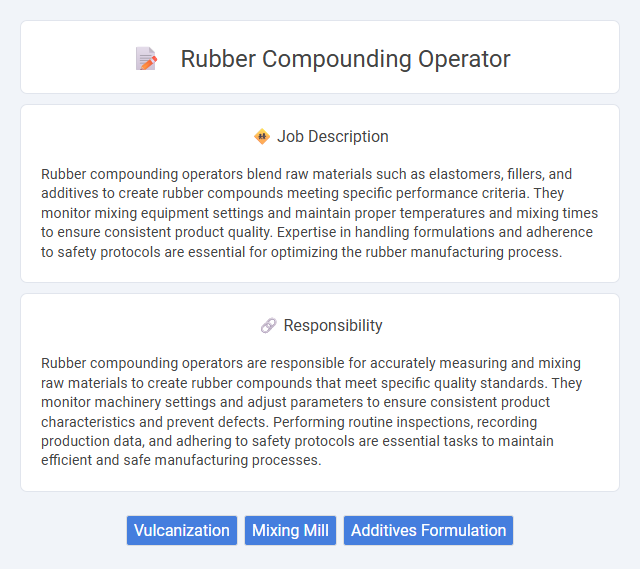
Rubber compounding operators blend raw materials such as elastomers, fillers, and additives to create rubber compounds meeting specific performance criteria. They monitor mixing equipment settings and maintain proper temperatures and mixing times to ensure consistent product quality. Expertise in handling formulations and adherence to safety protocols are essential for optimizing the rubber manufacturing process.
People with strong attention to detail and the ability to follow precise instructions are likely suitable for a Rubber Compounding Operator role, as the job requires measuring and mixing chemicals accurately. Those who can work in team environments and maintain safety protocols under industrial conditions may handle the physical and repetitive nature of the tasks effectively. Individuals prone to sensitivity to chemicals or struggling with manual dexterity might find this position challenging to perform consistently.
Qualification
Rubber compounding operators typically require a high school diploma or equivalent, with specialized training in chemical processing or polymer science preferred. Proficiency in operating mixing machines and understanding rubber formulas is essential for ensuring consistent product quality. Experience with quality control procedures and safety regulations enhances an operator's ability to manage production efficiently.
Responsibility
Rubber compounding operators are responsible for accurately measuring and mixing raw materials to create rubber compounds that meet specific quality standards. They monitor machinery settings and adjust parameters to ensure consistent product characteristics and prevent defects. Performing routine inspections, recording production data, and adhering to safety protocols are essential tasks to maintain efficient and safe manufacturing processes.
Benefit
Rubber compounding operators likely experience benefits such as stable employment due to steady demand in manufacturing industries. They may gain specialized skills that enhance job security and career advancement opportunities. On-site benefits could include health insurance, retirement plans, and potential overtime pay, improving overall compensation.
Challenge
Rubber compounding operators likely face challenges related to maintaining precise formulations while adapting to variations in raw materials and equipment performance. The complexity of chemical interactions in rubber compounds may require continuous monitoring and adjustment to ensure consistent product quality. Workers in this role probably need strong problem-solving skills to troubleshoot issues that arise during processing and production.
Career Advancement
Rubber compounding operators gain valuable expertise in mixing raw materials to create specialized rubber products, opening pathways to advanced technical and supervisory roles in manufacturing plants. Proficiency in chemical formulation and quality control can lead to positions such as senior compounder, production supervisor, or process engineer. Continuous skill development and certifications in polymer science enhance career growth prospects within the rubber and elastomer industry.
Key Terms
Vulcanization
Rubber compounding operators play a critical role in the vulcanization process by accurately blending raw rubber with additives such as sulfur, accelerators, and activators to enhance the material's elasticity and strength. Mastery of mixing techniques and precise control of temperature and pressure during vulcanization directly impact the durability, resilience, and performance of the final rubber products. Operators ensure consistent quality by monitoring chemical reactions and adjusting formulations to meet specific industry standards in automotive, aerospace, and manufacturing sectors.
Mixing Mill
A Rubber Compounding Operator working with a Mixing Mill precisely blends raw rubber with additives such as carbon black, oils, and curatives to achieve specific material properties. Mastery of mixing parameters like temperature, mill speed, and roll clearance ensures consistent compound quality and optimal physical characteristics. Proficient control of the Mixing Mill contributes to efficient production cycles and minimizes waste in rubber manufacturing processes.
Additives Formulation
Rubber compounding operators specialize in additives formulation to enhance the physical and chemical properties of rubber blends, ensuring optimal performance in diverse applications. They precisely measure and mix key additives such as fillers, plasticizers, accelerators, and vulcanizing agents, maintaining stringent quality control standards. Expertise in compound formulation techniques directly impacts product durability, elasticity, and resistance to heat and chemicals.
 kuljobs.com
kuljobs.com